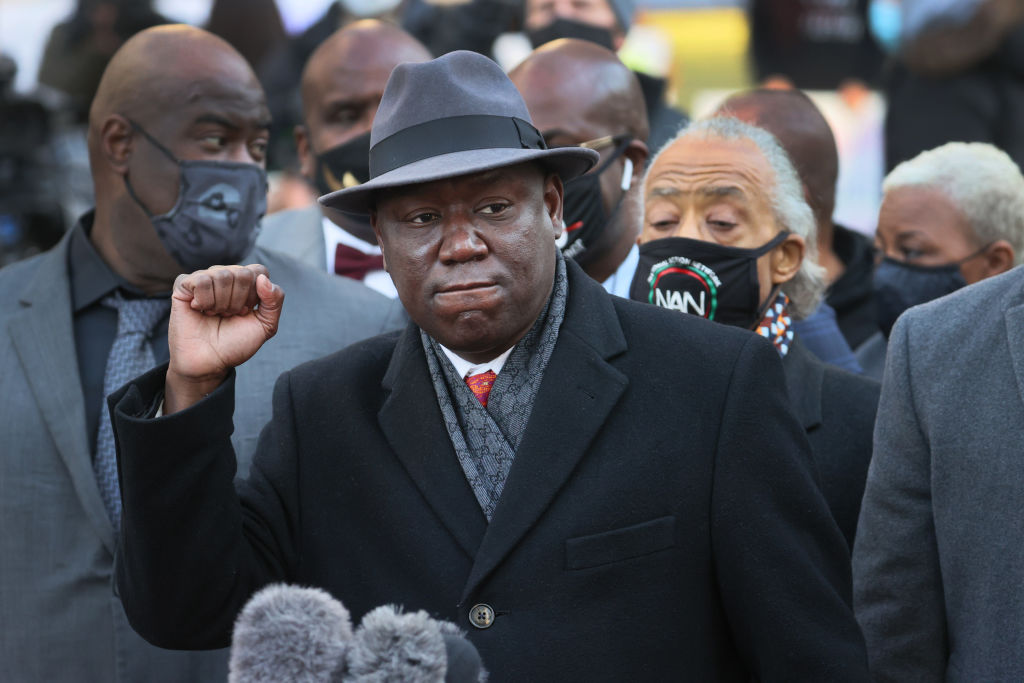Shanquella Robinson’s Mother Pleads To White House For Help
‘I Need Justice From Somebody!’ Shanquella Robinson’s Mother Pleads To White House For Help

Shanquella Robinson. | Source: Twitter
UPDATED: 3:30 p.m. ET, May 19
Originally published on March 2
It’s been over 200 days since the death of Shanquella Robinson and her mother still doesn’t have the answers she deserves.
Sallamondra Robinson spoke during a Rally in D.C. of Friday urging for help in getting answers in Shanquxlla’s death.
“I need justice from somebody, she said to the crowd as they hung on her every word. “Somebody needs to be arrested for this. We can’t sleep, we can’t eat, we’re barely holding down a job because we’re not getting justice for her and she needed justice. I need people to stand up.”
Civil rights attorney Ben Crump says they have met with the White House and have asked them to prioritize bringing those accountable for Shanquella Robinson’s death to justice. White House officials have yet to confirm the meeting.
The case of the mysterious death of Shanquella Robinson may, unfortunately, go unsolved.
In April, federal prosecutors announced they will not be filing criminal charges in her death.
Robinson and as many as six of her friends arrived at Cabo on Oct. 28. The next day, she was allegedly shown on video footage being beaten up by another young woman. It appeared that at least two people were filming the violence – the person who recorded the video posted on social media and another person whose phone could also be seen recording the footage. During the violence, a man’s voice could be heard imploring “Quella” — the woman identified as Robinson — to “at least fight back.”
While Shanquella Robinson’s friends blamed her death on alcohol poisoning, an autopsy performed by Mexican authorities determined that she did not have alcohol in her system.
A Mexican police report claims that a doctor from a local hospital was with Robinson and other people staying at the villa for almost three hours before she was pronounced dead on Oct. 29.
United States Attorney Dena King and the FBI, who met with the Robinson family early Wednesday morning, said there was just not enough evidence to charge anyone with a crime.
“Based on the results of the autopsy and after a careful deliberation and review of the investigative materials by both U.S. Attorneys’ Offices, federal prosecutors informed Ms. Robinson’s family today that the available evidence does not support a federal prosecution.”
The Robinson family is expected to hold a press conference today.
Ben Crump and attorney Sue-Ann Robinson presided over a press conference last month to demand President Joe Biden’s administration and the U.S. State Department exercise “diplomatic intervention” to arrest and charge the person or persons responsible for the death of Shanquella Robinson, 25. The two attorneys were joined in the nation’s capital by Robinson’s family, activist Tamika Mallory and Akosua Ali, the president of the NAACP’s D.C. branch, among others.
The group demanded “diplomatic intervention” in order to help Mexico hold the responsible parties accountable.
The press conference came on the heels of attorney Robinson making similar demands this week. Sue-Ann Robinson, who has been working with Shanquella’s family in North Carolina, told WSOC-TV that her efforts have been met with bureaucratic red tape from Mexico.

Source: Scott Olson / Getty
From WSOC:
“We weren’t greeted by the consulate and taken to the attorney general’s office, we kind of had to make our way in order to get the information,” Robinson told Channel 9. “We did not receive any assistance from [the Consulate], despite their knowledge of the protocols and Mexico that the attorney general would require the consulate to be involved because it is a crime involving a U.S. citizen.”
Ultimately, the attorney was able to get information from the Mexican attorney general, who said they had completed their investigation and prepared an extradition packet. That extradition information was forwarded to U.S. authorities, and the attorney says they’re essentially “waiting for our government to do the next steps in the process.”
Sue-Ann Robinson added:
“It is a unique case in that this extradition process is requiring the United States to essentially turn over a United States citizen or citizens to the Mexican government in order to be brought to justice under their criminal justice system,” the attorney said. “But it’s not something that’s unprecedented or that lacks a protocol for it to be done, it just takes a high-level diplomatic intervention.
“Someone has to come forward and say, ‘You know what, I’ll be the one that’s responsible to talk to the Mexican government and make sure that extradition is happening, that the protocols and everything that’s in place to effectuate something like this is happening in a timely manner.’ And based on what I’ve seen so far, and based on what the family is being advised, it’s just not being done.”
What happened?
Shanquellla was with several “friends” when she died in her villa at the upscale Fundadores Beach Club in Cabo, Mexico. Her death was reported on Oct. 29. Initially, her travel mates told her mother Sallamondra Robinson that she had died of alcohol poisoning, but a death certificate later revealed that she passed away from a “severe spinal cord injury and atlas luxation,” an instability of neck vertebrae. Around the same time, a video of Shanquella being viciously beaten by one of her “friends” also surfaced. At least two people filmed the violence and one male voice can be heard urging “Quella” to “fight back.”
Excerpts from a police report obtained by The Charlotte Observer claim a doctor from a local hospital was with Shanquella and other house members for almost three hours before she was pronounced dead.
Authorities have since ruled Shanquella’s death as femicide.
Authorities from the state attorney general’s office of Baja California Sur in Mexico issued an arrest warrant for an unnamed woman who was “likely responsible” for the hair care entrepreneur’s death. Social media users closely linked to Shanquella’s “friend” group have alleged that the suspect seen in her startling attack video is a woman named Daejhanae Jackson, but her name is not mentioned in the arrest warrant.
“This case is fully clarified, we even have a court order, there is an arrest warrant issued for the crime of femicide to the detriment of the victim and against an alleged perpetrator, a friend of her who is the direct aggressor,” Mexican prosecutor Daniel de la Rosa Anaya reportedly said. “Actually it wasn’t a quarrel, but instead a direct aggression. We are carrying out all the pertinent procedures such as the Interpol alert and the request for extradition to the United States of America. It’s about two Americans, the victim, and the culprit.”
The U.S. and Mexico’s extradition treaty provides for the return of those who have committed crimes and fled across the United States/Mexico border. Typically, in order for extradition to be carried out, the suspect must be located and arrested first. Mexican officials have not confirmed any arrests as of yet.
What can actually happen legally?
Joey Jackson, an attorney and legal analyst for CNN, said there are two ways the arrest warrant can play out. One option is to have the “friend” extradited as requested by Mexico. “You could see Mexico engage in the prosecution,” Jackson told CNN.
The other choice is for the U.S. government to become involved and try the case in the U.S.
“In the event you go overseas and an American citizen is ultimately killed by another American citizen, there’s a statute that could provide for the prosecution to take place in this country,” Jackson added.
Of course, Jackson said that more than three months ago, so it remains unclear whether the arrest warrant would be honored in the U.S.
There is a legal precedent for extradition
An international treaty with provisions for extraditions to and from Mexico has been in place for 45 years. The Extradition Treaty Between the United States of America and the United Mexican States dates back to 1978 and was ratified in 1998 by President Bill Clinton, who said it was meant to “enhance cooperation between the law enforcement communities of both countries.”
About three years later, two U.S. citizens were ordered extradited to Mexico for the killings of two other U.S. citizens. Both suspects were arrested in the U.S. and then extradited to Mexico.
Notably, the announcement of the extraditions by the Southern District of California’s U.S. Attorney said: “The proceedings were held pursuant to the Extradition Treaty between the United States and Mexico, which obligates each nation to extradite offenders wanted in the other country.”
The treaty doesn’t always apply
There is at least one case in recent history when the treaty with Mexico was not honored by the U.S. At least, not yet.
Following the 2019 mass shooting at a Walmart in El Paso, Texas, the Mexican government moved to extradite the gunman for killing eight Mexican nationals during the shooting. Mexico’s foreign minister claimed the shooting was a “terrorist” act.
While Patrick Crucius just last month pleaded guilty to 90 federal charges from the mass shooting, the Washington Post reported at the time that it was doubtful he would be extradited to Mexico and be charged under that legal system.
Besides the press conference on Friday, Shanquella’s family has been calling for justice from day one.
Quilla Long, Shanquella’s sister, said she wants the person or people responsible for the death to be held accountable.
“Everybody being arrested and doing time in Mexico. Everybody being extradited over there and doing their time there. That would be justice for us as of now,” Long said in December.
SEE ALSO:
Shanquella Robinson’s Death Spotlights Other Black Women Mysteriously Dying Around Their ‘Friends’
Understanding The Epidemic Of Femicide: What It Is And How To Stop It
[ione_media_gallery id=”4498865″ overlay=”true”]








